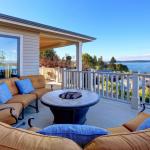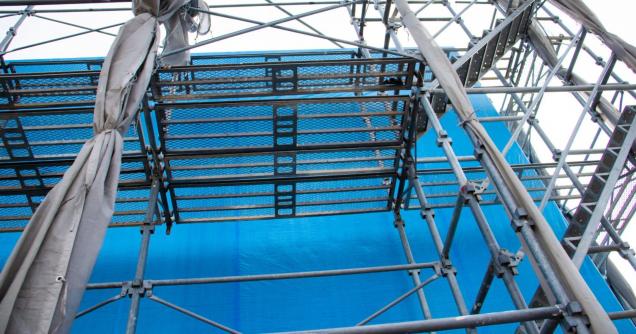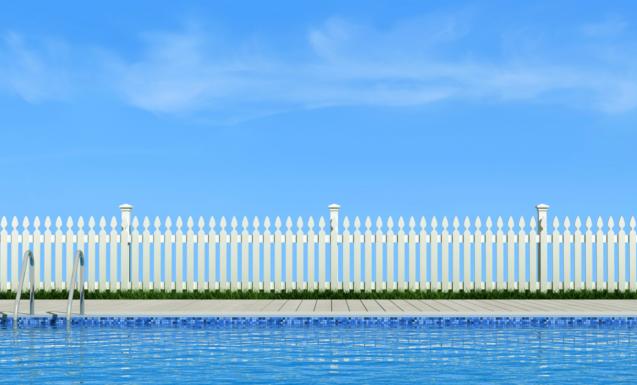
The Best Fencing & Gates for Seaside Locations
Erosion and harsh storms are just some of the downsides to coastal living in Australia. Coastal living is an Australian dream, the beachside views, the warm summer nights by the water and the BBQ’s are almost cultural for us. But the salty air and intense winds can cause damage to the exterior of your property – especially the fencing that surrounds your Perth home.
Different materials survive better in different circumstances, for example, timber is a beautiful warm material that improves the aesthetics of any home. But would I recommend timber for a coastal location? No way.
The environmental factors will break down and damage your timber fencing in a matter of years.
So what are the best options for coastal fencing?
Galvanised Stainless Steel Fencing
Stainless steel is a strong, secure metal and is less likely to be damaged. Steel fencing is ideal where strength and impact resistance is important as they are used mostly by those in the construction and resources industry. However stainless steel alone is not enough to protect the fence from environmental factors that could impact the durability and performance of the metal.
Many fence suppliers use only hot-dipped galvanised steel and that coating is zinc which prevents negative effects of corrosion and rust occurring on your fencing. It is probably the most trending alternative to wrought iron due to the similarities of galvanized to wrought iron and its affordability. Steel's strength and weight make it ideal for fencing that has to stand up against strong winds and threats like falling trees. Steel is also the ideal material for use as security fencing or for security gates.
Aluminium Fencing
Aluminium is an inexpensive alternative to materials like steel or iron and is also lightweight and naturally resistant to corrosion and rust caused by coastal environmental elements.
One of the reasons that aluminium is less expensive than other materials, unlike steel, is that it is a lightweight material. While aluminium can stand up to corrosion from wind, rain, temperature changes, and salty air, it is easier to bend and reform than tougher metals such as steel.
While this keeps the cost of production low, it also means aluminium is less able to withstand a concerted effort to damage or breakthrough.
Those who are conscious of their environmental sustainability will be happy to know that aluminium is the most environmentally friendly fencing metal. Aluminium is recyclable, so if you have an aluminium fence and you want to get rid of it for any reason, it can be reused to make a new aluminium product without affecting the quality of the material at all. Melting the aluminium to create a new product uses less than 10 per cent of the energy that was needed to create the original aluminium product.
No wonder aluminium fencing is so popular in coastal areas!
Vinyl Fencing
Whilst no comparison to the benefits of stainless steel fencing, vinyl is a material that can still offer a significant amount of strength and flexibility. Vinyl fencing is suitable for locations that are prone to extreme weather conditions and it can endure saltwater exposure plus the strong winds and rain notorious to coastal suburbs.
Use steel where strength and impact resistance is important. Use aluminium where your concern is only corrosion. Aesthetically, steel, vinyl and aluminium are good choices. Steel may be a better choice for a classic wrought-iron look fence, while aluminium and vinyl may be better for a more modern appearance or for pool fencing. All choices come in a wide range of styles, so if the style is your most important consideration, compare vinyl and aluminium.
Different materials survive better in different circumstances, for example, timber is a beautiful warm material that improves the aesthetics of any home. But would I recommend timber for a coastal location? No way.
The environmental factors will break down and damage your timber fencing in a matter of years.
So what are the best options for coastal fencing?
Galvanised Stainless Steel Fencing
Stainless steel is a strong, secure metal and is less likely to be damaged. Steel fencing is ideal where strength and impact resistance is important as they are used mostly by those in the construction and resources industry. However stainless steel alone is not enough to protect the fence from environmental factors that could impact the durability and performance of the metal.
Many fence suppliers use only hot-dipped galvanised steel and that coating is zinc which prevents negative effects of corrosion and rust occurring on your fencing. It is probably the most trending alternative to wrought iron due to the similarities of galvanized to wrought iron and its affordability. Steel's strength and weight make it ideal for fencing that has to stand up against strong winds and threats like falling trees. Steel is also the ideal material for use as security fencing or for security gates.
Aluminium Fencing
Aluminium is an inexpensive alternative to materials like steel or iron and is also lightweight and naturally resistant to corrosion and rust caused by coastal environmental elements.
One of the reasons that aluminium is less expensive than other materials, unlike steel, is that it is a lightweight material. While aluminium can stand up to corrosion from wind, rain, temperature changes, and salty air, it is easier to bend and reform than tougher metals such as steel.
While this keeps the cost of production low, it also means aluminium is less able to withstand a concerted effort to damage or breakthrough.
Those who are conscious of their environmental sustainability will be happy to know that aluminium is the most environmentally friendly fencing metal. Aluminium is recyclable, so if you have an aluminium fence and you want to get rid of it for any reason, it can be reused to make a new aluminium product without affecting the quality of the material at all. Melting the aluminium to create a new product uses less than 10 per cent of the energy that was needed to create the original aluminium product.
No wonder aluminium fencing is so popular in coastal areas!
Vinyl Fencing
Whilst no comparison to the benefits of stainless steel fencing, vinyl is a material that can still offer a significant amount of strength and flexibility. Vinyl fencing is suitable for locations that are prone to extreme weather conditions and it can endure saltwater exposure plus the strong winds and rain notorious to coastal suburbs.
Use steel where strength and impact resistance is important. Use aluminium where your concern is only corrosion. Aesthetically, steel, vinyl and aluminium are good choices. Steel may be a better choice for a classic wrought-iron look fence, while aluminium and vinyl may be better for a more modern appearance or for pool fencing. All choices come in a wide range of styles, so if the style is your most important consideration, compare vinyl and aluminium.



